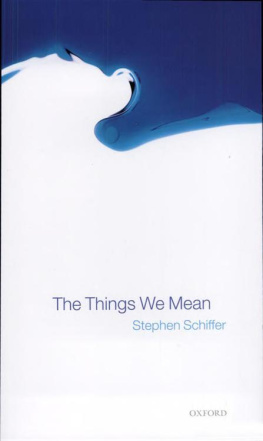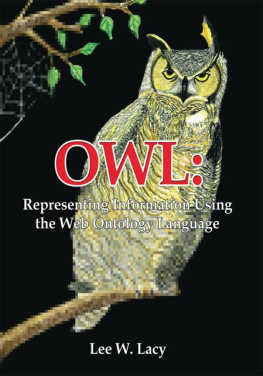Schiffer, Stephen , Department of Philosophy, New York University The Things We Mean Print publication date: 2003
Published to Oxford Scholarship Online: April 2005
Print ISBN-13: 978-0-19-925776-8
doi:10.1093/0199257760.001.0001 Abstract: There exist such things as the things we mean and believe, and they are what the book calls pleonastic propositions. The book is about what these propositions are in themselves, and about their place in nature, language, and thought. Chapters 1 and 2 advance the theory of pleonastic propositions, and of pleonastic entities generally. The remaining six chapters bring that theory to bear on issues in the theory of content: the existence and nature of meanings; knowledge of meaning; the relation between content-involving facts and underlying physical facts; vagueness and indeterminacy; conditionals; normative discourse; and the role of pleonastic propositions in explanation, prediction, and knowledge acquisition.
Keywords: conditionals,explanation,indeterminacy,knowledge of meaning,language,meaning,normative discourse,pleonastic proposition,thought,vagueness
|
THE THINGS WE MEAN end p.i |
|
The Things We Mean CLARENDON PRESS OXFORD end p.iii |
|

Great Clarendon Street, Oxford ox 2 6 dp
Oxford University Press is a department of the University of Oxford.
It furthers the University's objective of excellence in research, scholarship,
and education by publishing worldwide in
Oxford New York
Auckland Bangkok Buenos Aires Cape Town Chennai
Dar es Salaam Delhi Hong Kong Istanbul Karachi Kolkata
Kuala Lumpur Madrid Melbourne Mexico City Mumbai Nairobi
So Paulo Shanghai Taipei Tokyo Toronto
Oxford is a registered trade mark of Oxford University Press
in the UK and in certain other countries
Published in the United States
by Oxford University Press Inc., New York
Stephen Schiffer 2003
The moral rights of the author have been asserted
Database right Oxford University Press (maker)
First published 2003
All rights reserved. No part of this publication may be reproduced,
stored in a retrieval system, or transmitted, in any form or by any means,
without the prior permission in writing of Oxford University Press,
or as expressly permitted by law, or under terms agreed with the appropriate
reprographics rights organization. Enquiries concerning reproduction
outside the scope of the above should be sent to the Rights Department,
Oxford University Press, at the address above
You must not circulate this book in any other binding or cover
and you must impose this same condition on any acquirer
British Library Cataloguing in Publication Data
Data available
Library of Congress Cataloging in Publication Data
Data available
ISBN 0-19-824108-9 (hbk.)
ISBN 0-19-925776-0 (pbk.)
1 3 5 7 9 10 8 6 4 2
end p.iv |
|
Acknowledgments So many people, over so many years, have helped to determine the views expressed in this book that I can't possibly attempt to thank them here. Among those who have directly influenced this book, either by their comments on parts of it or by conversations with me about the views expressed in it, I would like especially to thank the following: an anonymous reader for Oxford University Press; David Barnett; Dorit Bar-On; Ned Block; Paul Boghossian; Ray Buchanan; David Chalmers; Cian Dorr; James Dreier; David Enoch; Kit Fine; Salvatore Florio; Lizzie Fricker; Paul Horwich; Janine Jones; Andreas Kemmerling; Nikola Kompa; Saul Kripke; Wolfgang Knne; Michael Lynch; Gary Ostertag; Adam Pautz; Chris Peacocke; Adrian Piper; Tobias Rosefeldt; Ian Rumfitt; Josh Schechter; Bartoz Wieckowski; and Tim Williamson. My greatest debt is to Hartry Field. Many of my views were forged or refined in my countless debates and discussions with him, and several of his comments on parts of earlier drafts of this book either suggested specific improvements or exposed mistakes. Most of all, I must thank Michele Crow and Joe Schiffer for the fun I had with them when I wasn't writing this book. S.S. end p.vii |
|
CONTENTS Introduction | | The Face-Value Theory | | Pleonastic Propositions | | Meanings and Knowledge of Meaning | | Having Meaning | | Vagueness and Indeterminacy | | Moral Realism and Indeterminacy | | Conditionals and Indeterminacy | | Why Pleonastic Propositions? Content in Information and Explanation | References | Index |
end p.ix |
|
end p.x Introduction Stephen Schiffer
Do there exist such things as the things we mean? If so, then those things are also the things we believe, and the things in terms of which we must understand not only the meanings of linguistic expressions, but their references and truth-value as well. If such entities as the things we mean and believe exist, an account of their nature must be the most foundational concern in what philosophers call the theory of content, whose concern is the nature of linguistic and mental representation. In this book I argue that there do exist such things as the things we mean and believe, and I aim to give an account both of their nature and of how that nature affects certain foundational issues in the theory of content which turn on the nature of content. The book may be viewed as dividing into two main parts. The first part consists of Chapters , and it articulates and partially motivates the positive theory of propositional content this book has to offer (the entire book provides a more complete case for the theory). In Chapter , 'The Face-Value Theory', a prima facie case is made for the face-value theory of belief reports of the form 'A believes that S': that theory of the logical form of those reports which must be defeated if it's not to be accepted. According to this theory, reports of the form in question say that A stands in the belief relation to the proposition that S. This theory leaves open the question of the nature of the propositions to which that-clauses refer. The debate about this further question among face-value theorists tends to presuppose the compositionality hypothesis that (nearly enough) the referent of a that-clause token is determined by its structure and the referents its component expressions have in that token. Virtually all face-value theorists who accept the compositionality hypothesis hold that the proposition to which a that-clause refers is, in a sense spelled out in the text, a structured proposition whose components are the referents the expressions in the that-clause have in that that-clause. This seems |
|
|











